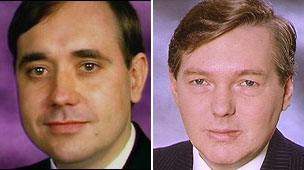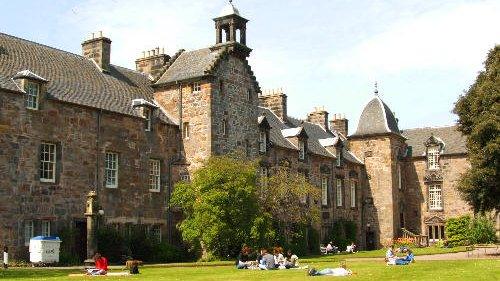'Ever to excel'
- Published

The traditional Raisin Monday celebrations at St Andrews welcomes new students
A wee while back, I chaired a conference on education. The particular topic under discussion was the Curriculum for Excellence, then at the height of a controversy which has since subsided somewhat, if not yet entirely.
The keynote speaker was a very senior academic; highly regarded and charmingly mischievous.
Talking of the new scheme for schools, he offered the following. It was not a curriculum. It was not about excellence. Therefore the only accurate word in the description was "for".
How the audience laughed, albeit through gritted teeth in some instances. But this little vignette has stuck with me (I am undoubtedly well into my anecdotage.)
I thought of it again as I listened to the wireless this morning. Did you catch the coverage about efforts by the University of St Andrews to extend their reach to students from the most deprived districts of Scotland?
The endeavour was dismissed as numerically miniscule by the National Union of Students, as the number of such entrants annually will rise from 14 to a target of 20.
'Good start'
But it was praised as a good start by the Education Secretary Mike Russell.
To be clear, the discussion concerns the most socially and economically disadvantaged. St Andrews' students outwith the target 20 do not all come from universally privileged backgrounds.
They are by no means all posh folk who would not know the price of milk, to borrow a phrase from one of Britain's more renowned game show contestants.

One famous past student is the future king, Prince William
I speak from experience, admittedly rather distant. Along with a slender, energetic Alex Salmond, I graduated from St Andrews in the 1970s. (He led the Nationalists, I edited the student paper.) I think we would both attest that our fellow St Andreans were thoroughly acquainted with the price of a pint.
Then as now, St Andrews is potentially open to all who can find their way to Leuchars Junction. Provided, of course, they can meet the competitive entry requirements.
It is restating the obvious, of course, but university is not open to all. University education is not comprehensively provided. There is selective entry, based largely upon external exam performance. Upon measurable academic excellence, in short.
More generally - and, arguably, for good reasons - we have become somewhat institutionally wary of excellence in its precise meaning. We prefer to talk of "excellence for all" - which, again taken literally, is a contradiction in terms.
We prefer to talk of enabling each pupil to extend their reach, to do the very best they can. Again, arguably, sound and well-intentioned.
However, once more and at its most obvious, universities cannot admit everyone and permit everyone to graduate. That would completely undermine the value of the degree, both domestically for employers and professions and globally for the many international students who seek out our excellent universities, ancient and modern, with concomitant economic and social gain for Scotland.
School grades
So selection there must be. Is it feasible though that entry requirements could be amended to take account of social circumstances which may have made it more difficult for certain students to acquire the requisite grades at school?
Some say yes. They argue that students from particularly deprived backgrounds should have that factor routinely taken into account when weighing their applications.

St Andrews University graduates - Alex Salmond and Brian Taylor
One can see the appeal - but possibly also the practical problems. Who determines the extent of deprivation - and thus the weight to be attached in assessing entry? Schools? Local authorities? The Scottish Government? Universities?
There is a philosophical debate here too. Can wider social inequity be addressed by structural manoeuvring at the very apex of education?
On Good Morning Scotland this morning, Mike Russell argued that it would be counterproductive to expect our universities to lower their grades as a general policy for particular sectors of society - although it was stressed both by him and by the university that individual circumstances would be taken into account.
Rather he - and the university - argued in favour of tackling the issue on a broader basis.
Shuffle responsibilities
Countering the impact of social deprivation from nursery onwards in an effort to ensure that all students had the chance to achieve top grades and thus access higher education.
Which, of course, could be a cop out unless there is real action - a way for the universities to shuffle responsibility to other sectors of education and society.
Again, both Mr Russell and St Andrews insisted that real action was in place and would be enhanced, through initiatives which seek to dispel some of the myths - and thus fears - about university access, through schemes which offer practical and continuing support.
The motto of St Andrews University is Aien Aristeuein - roughly rendered as "ever to excel." The challenge is thus to ensure that this ambition potentially includes all Scotland's citizens, without diminishing the pursuit of excellence.
- Published27 November 2012
